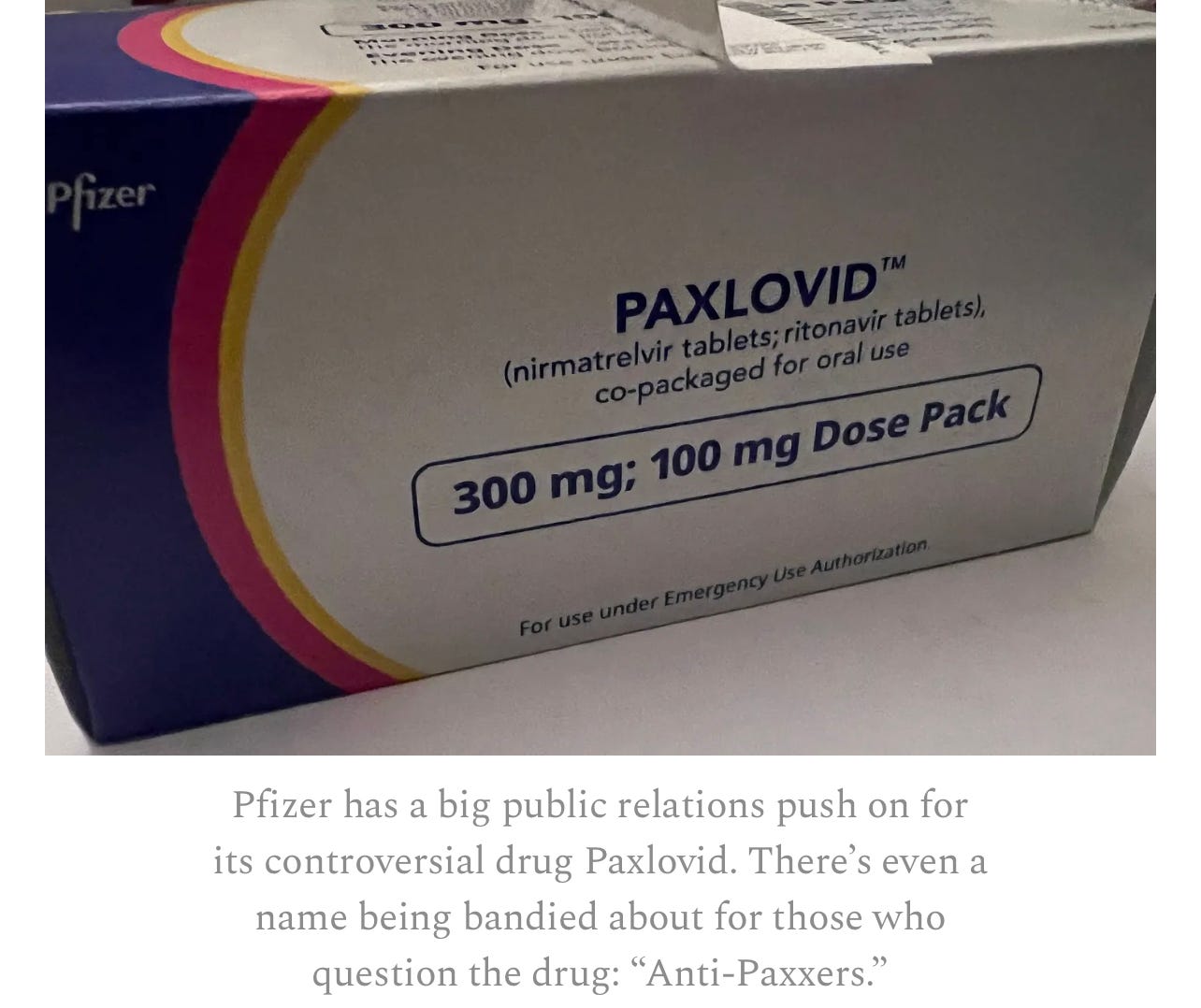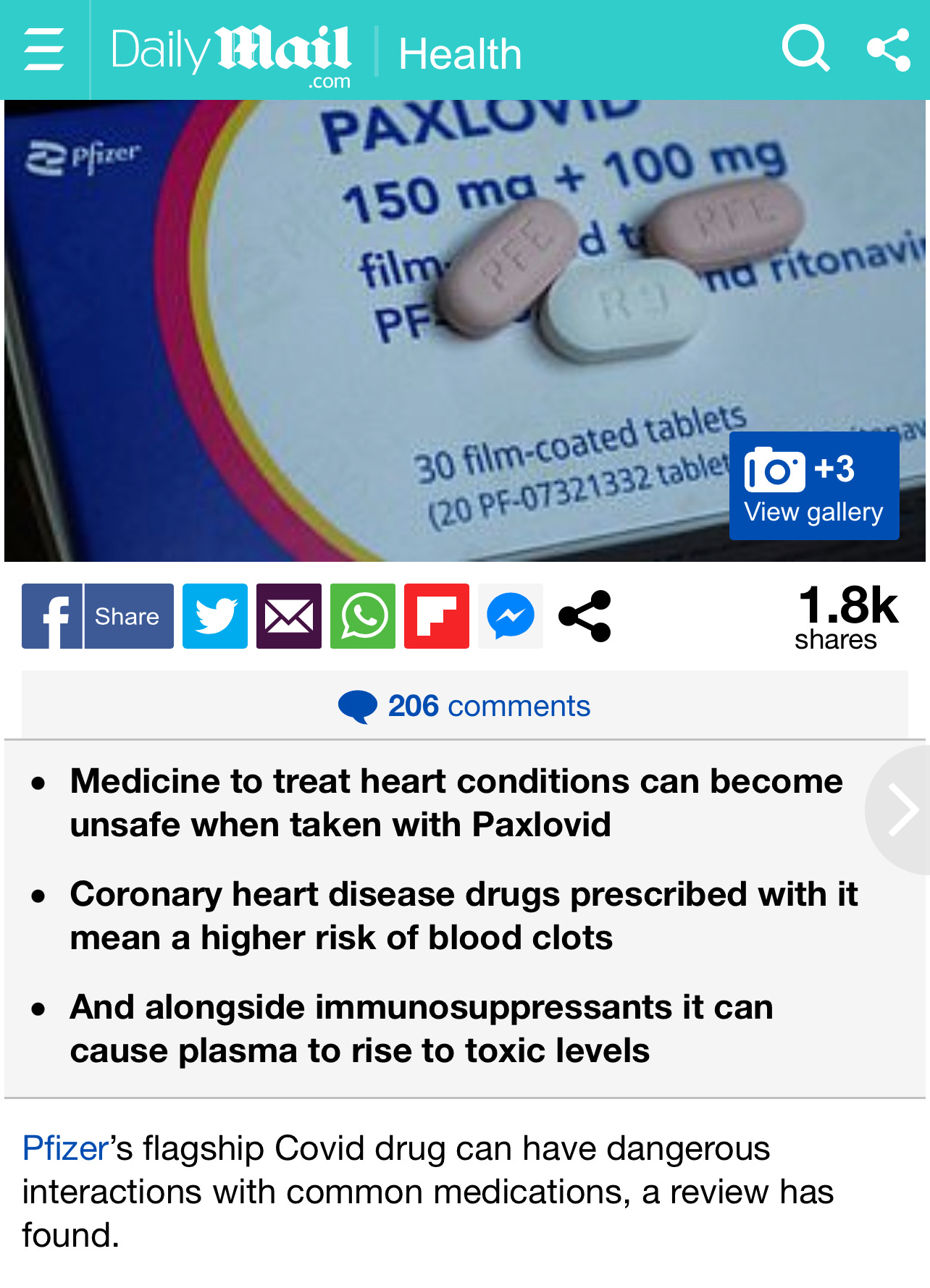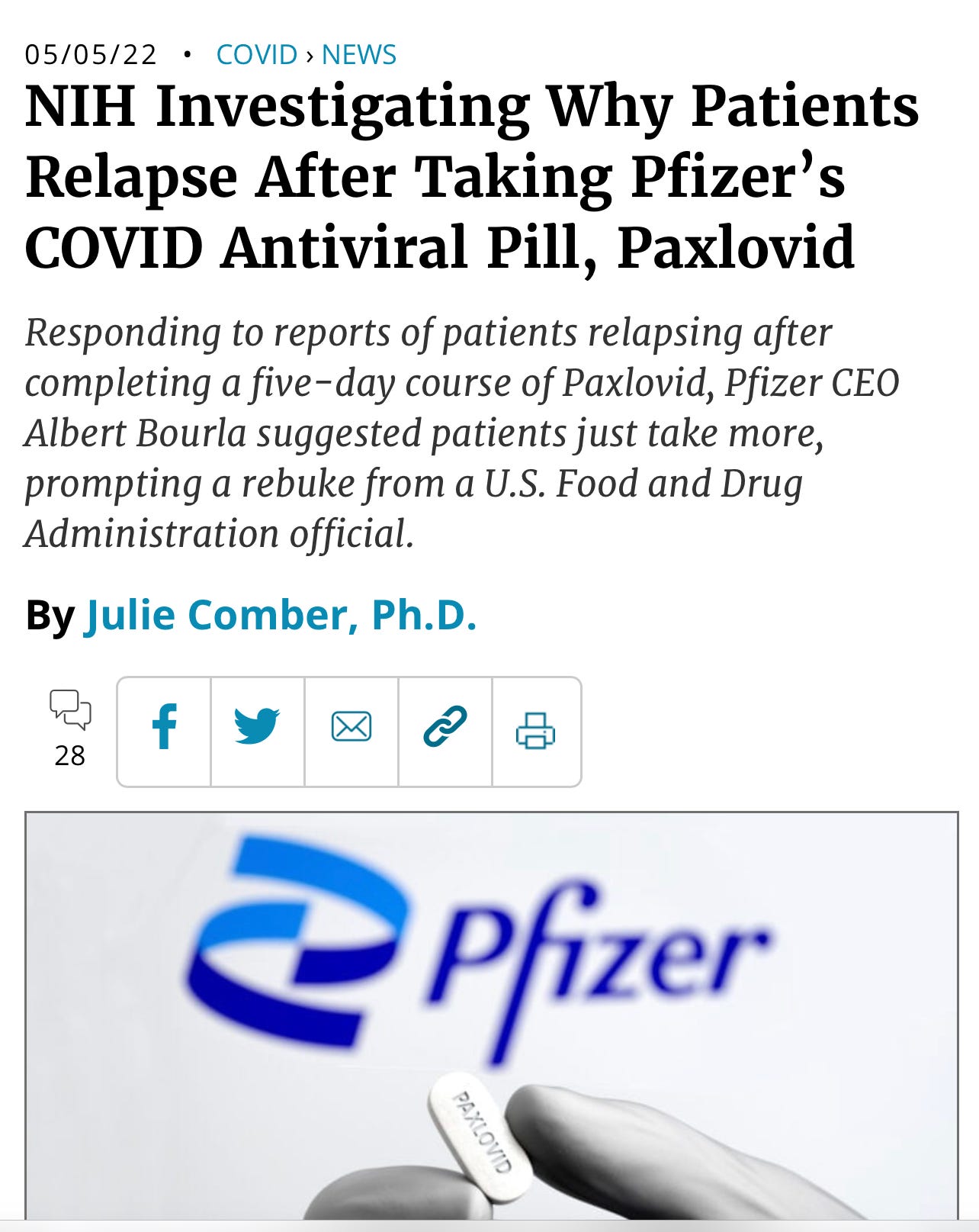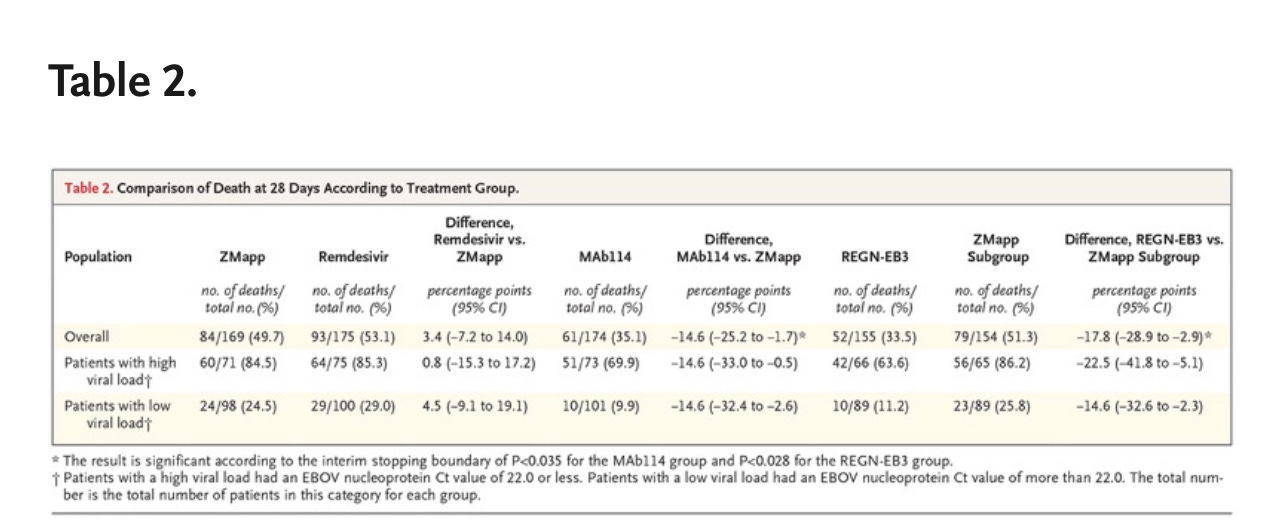Part 2: Remdesivir and Paxlovid: Two dangerous and ineffective “covid treatments” which are shockingly STILL being used - and which you should absolutely REFUSE
Once you have the information, you will certainly become an “anti-Paxxer.”
BS”D
(For Part 1, please see link at end of this article.)
Summary of major problems with Paxlovid:
1) Paxlovid has a BLACK BOX (danger) warning on it because one of the components is Ritonavir, a dangerous HIV drug.
2) Paxlovid often causes a rebound of covid, with the patient much sicker than before, for a prolonged time.
3) Paxlovid can have extremely dangerous interactions with other common drugs that patients may be on.
4) Paxlovid can cause deadly blood clots when taken by patients who are taking certain medications.
5) Paxlovid can be dangerous for people with impaired kidney function.
6) Paxlovid has only has ONE of the TWENTY mechanisms of action of ivermectin, so it’s much less effective.
One of the red flags here is that pharmacists are allowed to prescribe (and dispense) Paxlovid. Did you ever hear of that exception to the law for ordinary drugs, no matter how safe and routine? What’s frightening is that Paxlovid has so many possible dangerous interactions with other drugs, that you really would not want someone prescribing it on the fly.
Another anomaly is that Pfizer excluded vaccinated people from the original Paxlovid trial - but then turned around and marketed the drug to them.
Thirdly, Pfizer’s Paxlovid trial did not include children, but the FDA authorized it for kids anyway. (Although Pfizer announced in March 2022 that they were beginning a children’s Paxlovid clinical trial, there is no data from this trial reported on Pfizer’s website as of February 11, 2024, and their site states: “The safety and effectiveness of PAXLOVID have not yet been directly established in pediatric patients.”)
Plus, we don’t know what dangerous mutations Paxlovid may create.
Here is a great article about how Paxlovid is being uber-promoted by media and paid-off medical practitioners, despite its very troubling rap sheet. (Most of article included, link below.)
Are You an Anti-Paxxer?
As doctors drop Paxlovid because of drug interactions and research shows it causes Covid rebounds and virus shedding, Pfizer and MSM crank the PR machine to hide the facts and shame "anti-paxxers."
By Linda Bonvie, February 9, 2024
When an article by Los Angeles Times metro reporter Rong-Gong Lin II recommended last month that practically everyone who tests positive for Covid takes Pfizer’s Paxlovid, some media veterans may have wondered what had become of the traditional wall between news reporting and advertising.
The story, which appeared on January 28, swept away almost all of the reservations that have been raised about the safety and effectiveness of this patent medicine, assuring us that “Paxlovid rebound” is a non-issue and fear of serious side effects is “erroneous.” It even went so far as to suggest that if your doctor won’t prescribe this “highly effective” medication, it’s time to go doctor shopping.
So why is this LA Times writer so desperately trying to sell us this fast-tracked antiviral that comes with a black box warning?
The article appeared at a particularly critical time for Pfizer just as it transitions from Emergency Use Authorization, or EUA Paxlovid, to FDA-approved Paxlovid. Originally free to patients, the medication was stockpiled by the U.S. government to the tune of 24 million treatment courses at a cost to taxpayers of $530 a box. Now, the FDA-approved version (same drug, different box) sells for a list price of up to $1,500. (According to an analysis by researchers at Harvard University, the actual cost to Pfizer for a five-day Paxlovid course is $13).
But to Pfizer’s chagrin, it now doesn’t seem to be able to even give the stuff away, let alone sell it at a premium price. Last fall Pfizer accepted a return of nearly 8 million boxes sent back by the U.S. government.
What’s a drugmaker to do when both patients and doctors shun a product that was anticipated to be the better half of Pfizer’s post-Covid “multibillion-dollar franchise?
Flush with all that Covid cash and new Paxlovid FDA approval last May, Pfizer went shopping for partners to help promote its products.
No stranger to top-tier PR firms such as Edelman and Ogilvy, the drugmaker tagged two of the biggest names in contemporary communications companies, Publicis Groupe, a Paris-based giant PR and ad agency, and the humongous Interpublic Group. These high-level agencies come at a big price tag, but what they can offer is priceless—a way to get your story told by respected media outlets.
That’s right, if you have enough money to hire the folks with all the right contacts, you too can create your own “news!”
Side effects be gone!
First, there’s the article’s headline, which began: “If it’s COVID, Paxlovid”? Getting your oft-advertised product’s rhyming tagline in a headline—now that’s branding! And we don’t have to tell any of the side effects in this venue. The LA Times piece was off to a great start.
Why aren’t more people being given Paxlovid, the reporter wanted to know. It’s “cheap or even free for many,” he said. And then he delivered his first rave review, calling it “highly effective.”
By paragraph four, however, our intrepid reporter had uncovered the bad news that “a number of doctors are still declining to prescribe it.” But why? It must be those pesky “outdated arguments” about “Paxlovid rebound.” Anyone who gets Covid “has a similar rare chance of rebound,” he told us. For extra punch, he called on Dr. Peter Chin-Hong, professor of medicine at UCSF, to back up that statement. Rebound is “like, bogus” and “just dumb,” Chin-Hong said.
What Lin didn’t report is that a study published in the Annals of Internal Medicine in November 2023, by researchers from Mass General Brigham, found that in Covid patients taking Paxlovid, rebound was “much more common” and often without symptoms. Nearly 21 percent had virologic rebound versus under 2 percent not on the drug. Of perhaps even more significance, prolonged viral shedding for an average of fourteen days was noted in those who rebounded, indicating that they “were potentially still contagious for much longer.” The virologic rebound “phenomenon,” in Paxlovid patients, the authors noted, “has implications for post-N-R (Paxlovid) monitoring and isolation recommendations.” This study closely monitored patients with follow-ups three times a week “sometimes for months.”
After quoting from several Paxlovid-positive FDA and CDC statements and referencing a California Public Health commercial where people dance to an upbeat tune singing “Test it, treat it, beat it, California you know you need it,” Lin got around to some serious stuff—side effects.
Not mentioned by Lin, but good to know anyway, Paxlovid bears an FDA-required black-box warning about drug interactions, cautioning of “potentially severe, life-threatening, or fatal events.” But the article carefully danced around this inconvenient issue, simply mentioning that some Paxlovid takers may need to have their medications adjusted. The fear of “serious side effects . . . is largely erroneous,” it claimed.
Really?
“There are 125 drug interactions (for Paxlovid) across twenty-five different classes of medicines,” author and FLCCC President Dr. Pierre Kory said in a phone interview. “I’ve never used any medicine that had that number and degree of drug interactions, and I find it absurd,” added Kory, who is an expert in early Covid treatment.
And this is no secret. The Paxlovid package insert lists thirty-nine specific drugs that interact with this anti-viral (which is not a complete list, we’re warned) including medications that treat conditions such as an enlarged prostate, gout, migraines, high blood pressure, high cholesterol, arrhythmias, and angina.
With side effects out of the way, our reporter moved on to an interesting idea—doctor shopping.
If your doctor turns you down for Paxlovid, “what other options are there?” How about “reaching out to another healthcare provider” we’re advised, one “who might be more knowledgeable about Paxlovid . . .”
Don’t be an ‘Anti-Paxxer!’
The LA Times isn’t alone in this timely pushing of Paxlovid. The New York Times also ran a glowing Paxlovid piece at the beginning of January. The black-box warning was glossed over by simply saying that some “doctors balk” over the “long list of medications not to be mixed with Paxlovid,” referring to the drug as being “stunningly effective.” The NYT reporter also added five mentions of a study—actually a preprint (not yet peer reviewed or published)—which through the use of statistical magic concluded that during the course of the research had only half of the eligible Covid patients in the U.S. taken Paxlovid, 48,000 lives would have been saved.
The server where the research was posted warns journalists and others when discussing preprints to “emphasize it has yet to be evaluated by the medical community and information presented may be erroneous.”
Paxlovid is not the only drug that gets special treatment by the media. Last January, a 60 Minutes segment was called out by the Physicians Committee for Responsible Medicine as “an unlawful weight loss drug ad” for the med Wegovy. The piece, it noted, “looked like a news story, but it was effectively a drug ad,” the group said in a press release. PCRM also stated that Novo Nordisk, which makes Wegovy, paid over $100,000 to the doctors CBS interviewed for the segment.
With this new frenzy to sell Paxlovid, one can’t help but compare it to the campaign against ivermectin. Kicked off by the FDA in August 2021, it successfully branded this Nobel Prize-winning, FDA-approved drug as nothing more than a horse dewormer endorsed by fanatical outlier doctors and accepted by gullible patients. Despite being found to be an extremely safe treatment as well as an effective one for Covid, the FDA, CDC, and its media “partners” made ivermectin the subject of false accusations and warnings about the supposed risks of using it.
But early on in the game it was decided, as Dr. Kory pointed out, “to keep the market open for their novel pricey Paxlovid pill.” And to that effect, nothing was going to stand in the way. In an interview last summer with the head of the UCSF Department of Medicine, FDA Commissioner Dr. Robert Califf admitted that he helped promote Paxlovid—something he acknowledged is explicitly against the rules.
“In normal times, the FDA should not be a cheerleader . . .” Califf said. But since back then EUA drugs could not be advertised (a policy that changed in the fall of 2022) he went ahead and pitched it himself.
The Paxlovid campaign is far from over. In fact, it may now be revving up to full throttle. There’s even a name being bandied about for those who question the drug: “Anti-Paxxers.”
Here are still-timely pieces from when Paxlovid first came out - nothing has changed!
Please see these articles for a list of the most dangerous drug interactions with Paxlovid:
Quote from Igor’s Newsletter:
“Mind you, Paxlovid is not a little harmless vitamin pill. It is a repackaged HIV/AIDS medication blocking certain liver functions, combined with a radically novel protease inhibitor affecting intricate intracellular processes.”
There are many, many reports of people taking Paxlovid at first improving, and then relapsing with covid symptoms again several days later, and even infecting others during their relapse.
THIS ISN’T NORMAL.
But Paxlovid is a great cash cow for Pfizer.
The following article by Daniel Horowitz, published on The Blaze, explains perfectly the utter hypocrisy of the establishment’s promoting Paxlovid, a weak antiviral, while shunning ivermectin, which is many times more effective.
It was published two years ago, but is as relevant as ever.
By Daniel Horowitz, December 22, 2021
We already know that every drug the FDA has approved so far for inpatient treatment has an FDA “black box warning” for serious adverse events. At present, the only approved drugs in-patient are remdesivir, baricitinib, and tofacitinib. None of them have demonstrated any efficacy over a year of their use, and remdesivir is known to cause liver toxicity and renal failure. Baricitinib (brand name Olumiant) has an FDA black box warning for blood clots, of all things! Tofacitinib (brand name Xeljanz) has a black box warning for “serious infections and malignancy.” Now, let me introduce you to the first candidates for outpatient treatment: Merck’s molnupiravir (brand name Lagevrio) and Pfizer’s Paxlovid.
Unlike Merck’s drug, which has a known dangerous mechanism of action as a nucleotide analogue, Paxlovid is more of a defensive drug as a 3CL protease inhibitor. Dr. Ryan Cole, a clinical and anatomic pathologist who has studied the replication process of SARS-CoV-2 and its treatments in more depth than almost anyone on the planet, explains the mechanism as follows:
When COVID replicates inside our cells, part of the process is formation of a long string of amino acids within our cell’s ribosome (hijacked by the virus to use as a protein manufacturing site), forming a chain of proteins called a polyprotein. In order for the proteins to form the parts of the virus, this chain must be clipped and broken down into the viral protein parts. An enzyme called a protease does this cutting and clipping. Paxlovid is a protease inhibitor, meaning it binds to this enzyme “scissors” and keeps the cutting from happening, so the virus cannot reassemble.
Sounds terrific, right?
Here’s the problem. Do you know what else is also the most effective protease inhibitor on the market? Ivermectin. And it also has at least 19 other mechanisms of action, which include anti-coagulant (inhibits CD147 receptor binding) and anti-inflammatory (decreases IL-6 and other inflammatory cytokines) modes of action. Paxlovid has none of these mechanisms. So why would we rely on an expensive drug with one of ivermectin’s 20 mechanisms of action – yes, 20 – that does not have an established safety profile when we can use an off-patent drug with the safest profile imaginable and mechanisms that work even in advanced stages? Also, Cole explains that because Paxlovid only has one mechanism of action, “viruses can eventually mutate around this mechanism.” Dr. John Campbell offers a superb presentation on the similarities and differences, showing why ivermectin is superior to Paxlovid.
Consider that earlier this year, a study in Nature of dozens of potential protease inhibitors against SARS-CoV-2 found ivermectin to be the only one to fully bind the 3LC enzyme. Out of 13 off-target drugs tested, “only ivermectin completely blocked (>80%) the 3CLpro activity at 50 µM concentration.”
So now that we are championing this mode of action, why wouldn’t we exalt the cheaper, more established medicine that is also an anti-coagulant and anti-inflammatory and that has shown the ability to turn around even some patients on ventilators? At best, Paxlovid would likely only work during the first three days of onset of symptoms, which is how the trial was conducted.
For full article, here is the source link:
Link below:
https://childrenshealthdefense.org/defender/nih-relapse-pfizers-covid-antiviral-pill-paxlovid/
Additional informative articles about the problems with Paxlovid:
https://greatgameindia.com/pfizer-covid-drug-paxlovid/
Part 1:











My 40 year old brother in law died in 24hours after having been put on a vent and “treated “ with Remdesivir. Was well enough to walk into the hospital but dead the next day. We begged him not to go but he was a gullible guy and trusted the establishment. RIP.
If something that doesn't work as such can be labeled and sold as an antiviral... we are in a load of trouble. This sets the standards very low moving forward for all "prescriptions". I realize this has most likely been happening for decades but I'm still trying to wrap my mind around the pure evil behind the intentions.